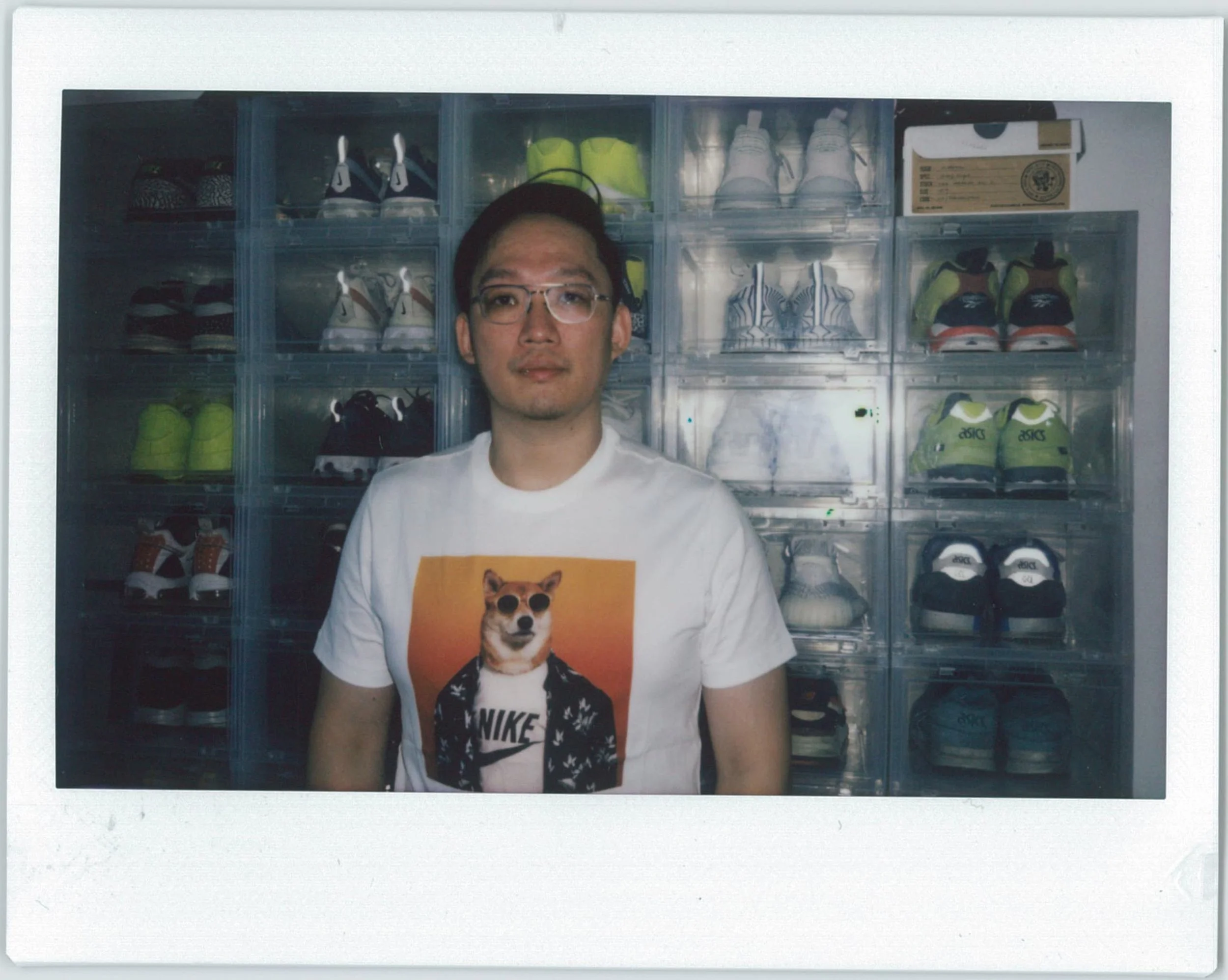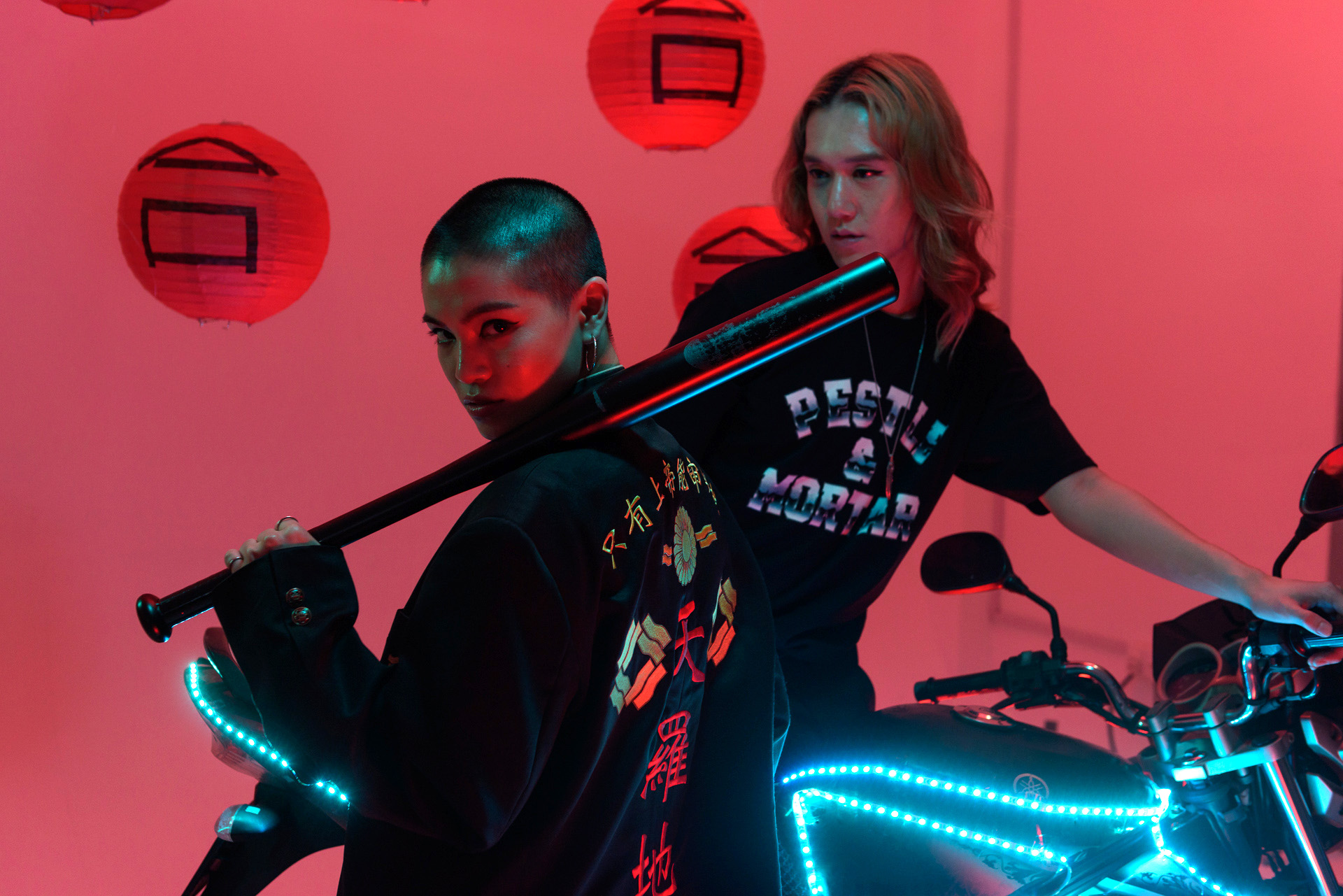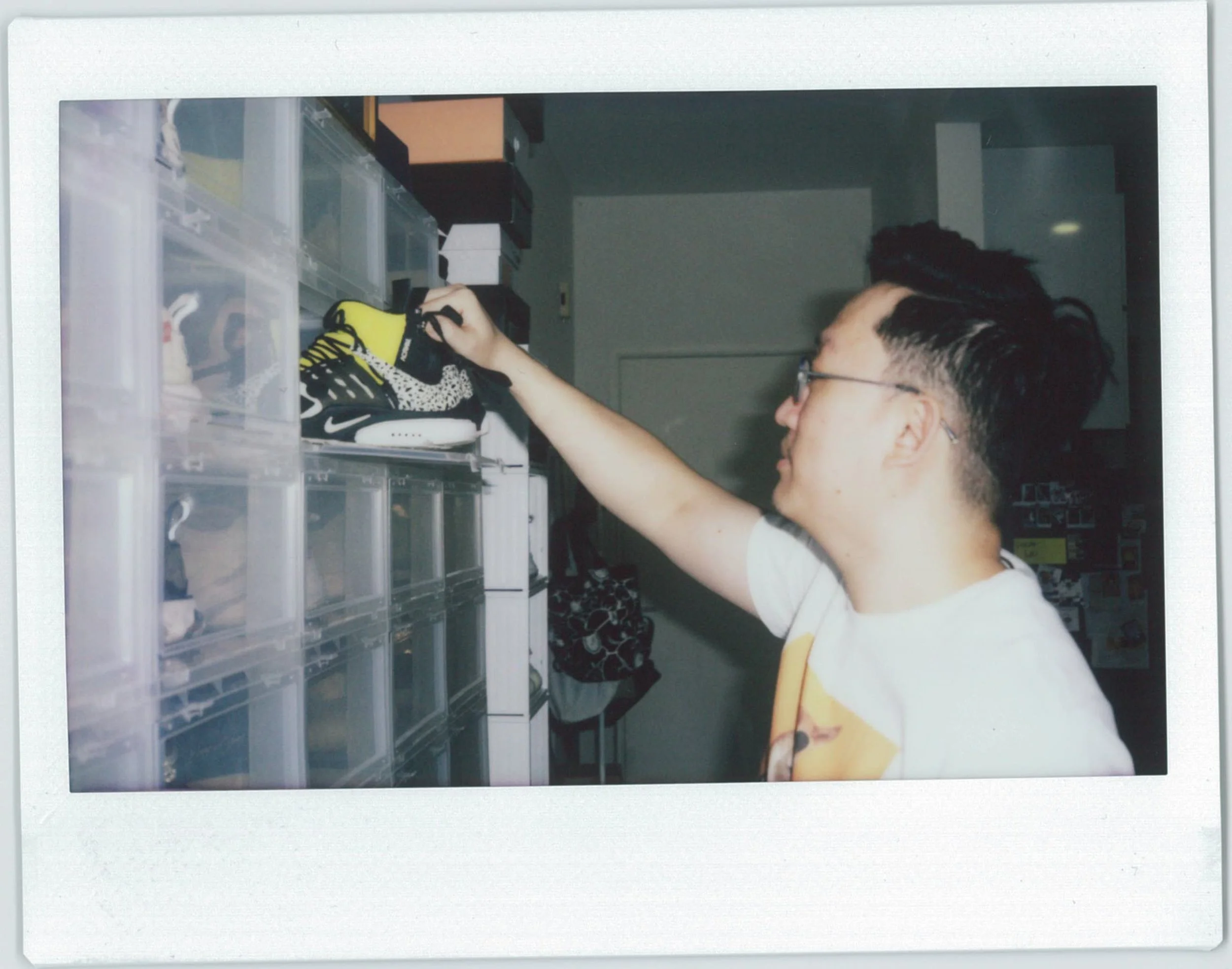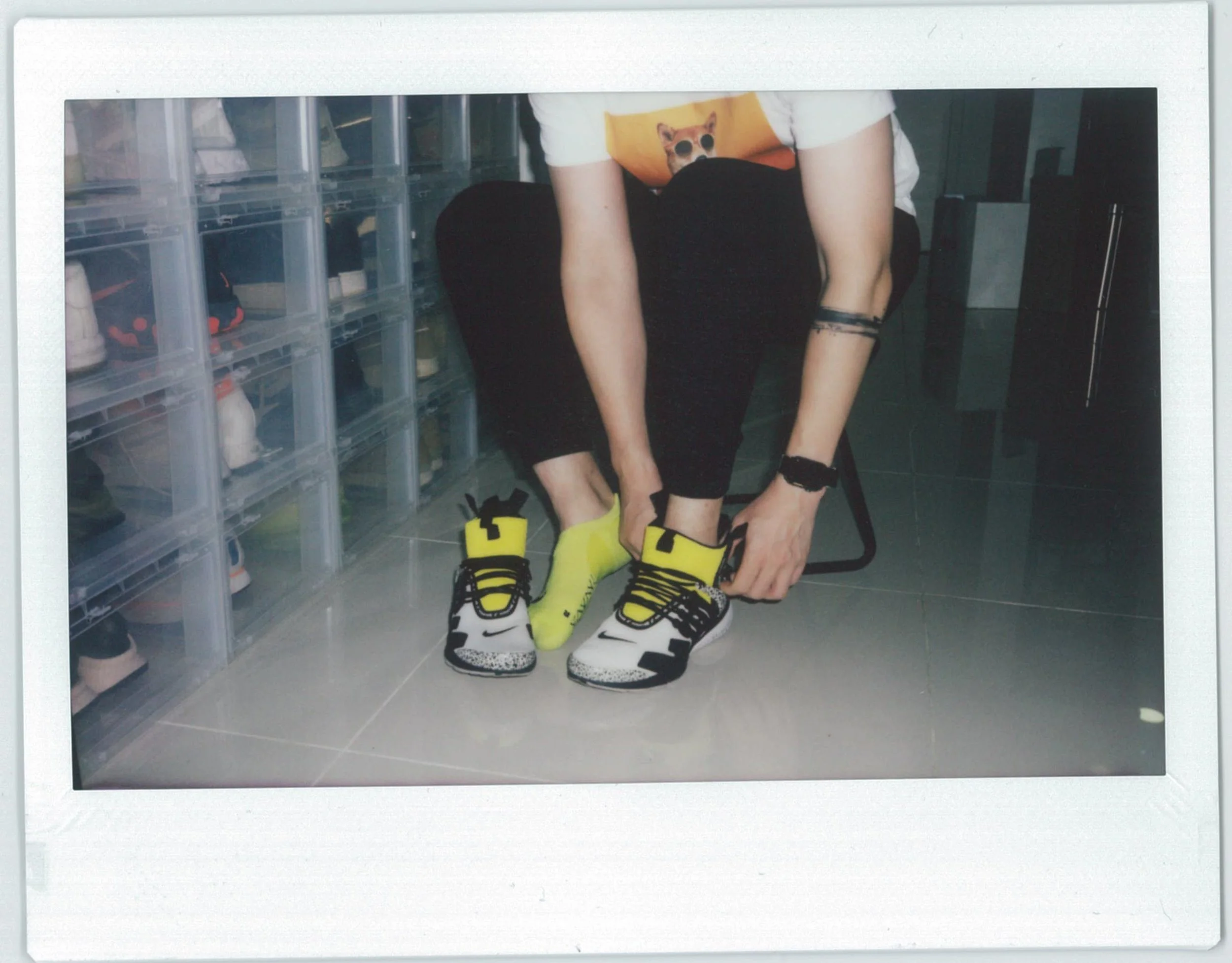There is nothing lukewarm about Lucas Lau. As a mentor, colleague and a friend, he shares the same intensity throughout the various interactions we share: no ifs, no buts; either on a 10 or 0. He only jumps in with both feet, sometimes head first. Not be confused with the local influencer who shares the same name (the one with the brows), Lucas claims to be the OG (by merit of age, not social media clout).
For a streetwear company that thrives off their team’s ability to constantly ‘wear multiple hats’, Lucas’ ever-changing formal job title at Pestle & Mortar Clothing is nothing more than a LinkedIn placeholder. As his intern, he was first introduced as the Head of Content where he had dangerously given me the authority to style an entire campaign with only tucked-in t-shirts. From initially overseeing social media and producing campaigns, he has since added marketing, communications and distribution under his belt. “Fuck whatever’s on your name card, you choose whatever title you want, because you’ll end up doing that and everything else,” he shrugs. He’s one of the only people I know who vocalises their profanities with a cadence that rings closest to the relief from taking a huge dump.
Prior to fashion, Lucas’ portfolio stemmed across the media industry from digital publishing in tech to production: both adjacent, yet pivotal towards his current role. Through co-founding his production house, he claims to have gained a pretty resourceful address book. As the former editor for Lowyat.NET, he takes pride in pioneering video-based content through Lowyat.TV (something he felt was too ahead of its time) and has come to appreciate the ability to work spontaneously. Unlike a traditional print publication, Lowyat.NET was time-sensitive, fast-paced and didn’t run off an editorial calendar—not unlike his current sphere in streetwear.
“Fuck whatever’s on your name card, you choose whatever title you want, because you’ll end up doing that and everything else”
A common role that seemed to occur across his career is project management. “It’s about following a timeline, and sticking to it. It’s not just about you, it’s about working together with the client—kind of like assembling the Avengers,” he says. After stumbling around blindly for a bit, he realised it was something he liked and was good at. “It’s easier pulling the right people in than pulling the technical skills myself,” he explains. Knowing who to plant where, and ways to work with them were major gains upon realising how everyone works differently, and that takes time. Aligning people to work towards a certain way is counterintuitive. He then reminded me of the time he spent harnessing me as an intern: to work towards the end goal through the way I wanted, all while making me less of a neurotic, jittery mess. Leadership to him matters more than just leafing through leadership books, “You don’t just lead from the front, you let them grow at their pace and walk with them.” While acknowledging the differences in leadership, Lucas is not one to call his peers bad leaders, “Everyone just has to learn more, rather than subscribing to their own style as the only form leadership.” Judging by the amount of creatives who have leveraged PMC as launching pads for their careers, his words carried more weight than the average anecdote.
In hindsight, Lucas laments on those who think they’re on top of their game. Almost to the extent of market cannibalism, Lowyat.NET’s presence as a pioneer in the local tech sphere made it easy feel like a know-it-all and be resistant towards change during his tenure. The bubble quickly burst upon starting his own production house, “We called it a digital marketing agency because it sounded cool.” Sure, the initial pay checks were fat, but lack of foresight towards good customer relationship and financial management eventually led to rockier days, as with most gig economies. “If the first year wasn’t so good, we would’ve stopped a long time ago,” he admits.
I pointed out that a big part of Lucas’ career trajectory was built on blind optimism, and he seemed to agree. While I was risk averse, he was… the reverse. I wondered why we got along so well. “Opposites attract, and you’ll always need someone to challenge your ideology,” he says.
Tess Pang and Joash Kong in Pestle & Mortar Clothing’s FW18 Lookbook
When asked if his gut feeling was an involuntary muscle or something he’s come to learn, he clarifies that he’s not in control of it. “It’s only when your gut is being quiet, you weigh your decision. And if you’re wrong, you’re wrong,” it’s what one should hear, but not always listen to. He brought up the decision to approve me and my co-stylist, Xia Yi’s pitch to cast Tess and Joash for Pestle & Mortar Clothing’s FW18 lookbook. The former is a bald, professional dancer and the latter is lanky, androgynous peroxide blond writer. On paper, these two couldn’t be more different than the conventionally pretty, pan-Asian models that PMC have been long associated with. When first presented, “What the fuck!” was his first reaction, “Eh no la bro, it would be fucking cool,” was his second thought. We got the green light, and the rest was history.
For someone who repeatedly claims to hate working with younger millennials/Gen Z-ers, Lucas has helped open doors for my peers and I. To have told an intern, probably three weeks into his internship “If you believe in this enough, I’ll have your back regardless,” goes to show the type of leadership he practices. “There’s no other way to illustrate faith, other than blind belief,” becomes more than a Ted talk tagline when he actually walk the walk. Why was he willing to work with this demographic, when he absolutely had no obligation to? The answer was a lot more factual than convictional: youths are the future. It’s not that he likes working with them, but he does take interest to invest when he sees a spark in them. Joe (@moderntraditional) is a prodigy he trains as much as he enjoys shitting on. “What about motivational talks in front of a uni crowd?” I joked, to which he replies “You inspire the youth by giving them opportunities, not by telling them what to do. People only listen to Ted talks when they’re taking a shit.”
I prodded him on something he once told me: he doesn’t consider himself a fashion person, but mores a streetwear enthusiast. He said he’s now grown to become a bigger fashion person over the past two years, attributing it to the shift in environment and streetwear culture. “Hypebeast would never post about fashion, back when streetwear was in its boom in the early 2010s,” he explains. As the line between luxury fashion and streetwear continues to blur, the motivation to stay in the know has only driven him to look outside the conventional bubble of streetwear. He started name dropping some of his recent interests like Undercover, Sacai, Rei Kawakubo—Japanese brands that he admires and subscribe to. Grailed is his source for streetwear memes. To thread back to his earlier fascinations, the word ‘streetwear’ used to connote a much narrower concept. It represented the energy and what the brand stood for, not a forced narrative for every t-shirt release. To him, the roots of streetwear represented the hunt in a pre-Instagram era where people scoured forums, “It was easier to get stuff you wanted, if you queued overnight, you’ll most probably get it.”
Now, he thinks ‘Culture’ is a bad word, presumably tainted by the ever-exemplified rat race for hype. “Streetwear was about the pedigree of the brand and stories behind the collaborations,” as he waxes poetic on early-on collaborations between Bape and Mastermind Japan, the sleuth of Hiroshi Fujiwara’s collaborations (“Not a designer, not a fashion guru, but the god of collabs”), where joint releases felt more sincere, organic and branched from the the idea of “If I don’t like it, I won’t do it”.
“You inspire the youth by giving them opportunities, not by telling them what to do. People only listen to Ted talks when they’re taking a shit.”
I told you he’s really into the Volt colourway.
The earliest memories I have of Lucas looked a little like this: all black ensemble, a Lansi cap, the Reebok x Crossover x Joe Chia MA-1 jacket with the occasionally confusing bandana. Now, he’s evolved into technical sweats, utility parkas, but still kept his terrifying affinity for all things in the Nike ‘Volt’ colourway—the ‘tech ninja’ style genre. “Too expensive,” his girlfriend interjects when he claims that he hasn’t been able to fully get into it. Other than giving high praise to Kim Jones for his utilitarian, techno vision for Dior Homme, Lucas extends his admiration for Off-White and Vuitton’s Virgil Abloh, “It’s about the audacity to waltz into Vuitton and putting neon plastic chains on their Keepalls. That’s the biggest fuck you. He literally took the Maison’s ageing population to 2050.” That’s not to say that he’s a fan of his clothes though. He still thinks Been Trill, Pyrex and Hood by Air are shit.
When asked about he thought how Malaysian streetwear was progressing, he foresees stagnancy as we wait for the next industry disrupter. Some names we threw around included Projek Jahat and Streething (to which Lucas claims as “the forum before all forums”) for their active involvement with the youth, not just for the youth. By drawing parallels with the meteoric rise of Korea’s streetwear industry from Hyein Seo to Ader Error, he stresses on the need for someone to challenge and grow the industry.
Didn’t matter if he considers himself streetwear or fashion. While the former is a less pretentious association compared to the latter than seemingly thrives off of artifice and inaccessibility, what mattered more was his pursuit of the new and fascination towards authentic narratives—something to build his conviction on. Call-to-actions through observation and collaborations with the youth only seemed instinctual at first glance. These were obvious root beliefs guided by tactful realisation. Nothing he said was surprising or bizarre, just consistent sentiments now in the form of a voice memo. For Lucas, blind optimism ultimately builds conviction upon trial and error.
Lucas Lau (@notucahs) produces and co-stars in his own fashion podcast with hitz.fm’s Arnold Loh called The Fashion Weak.




